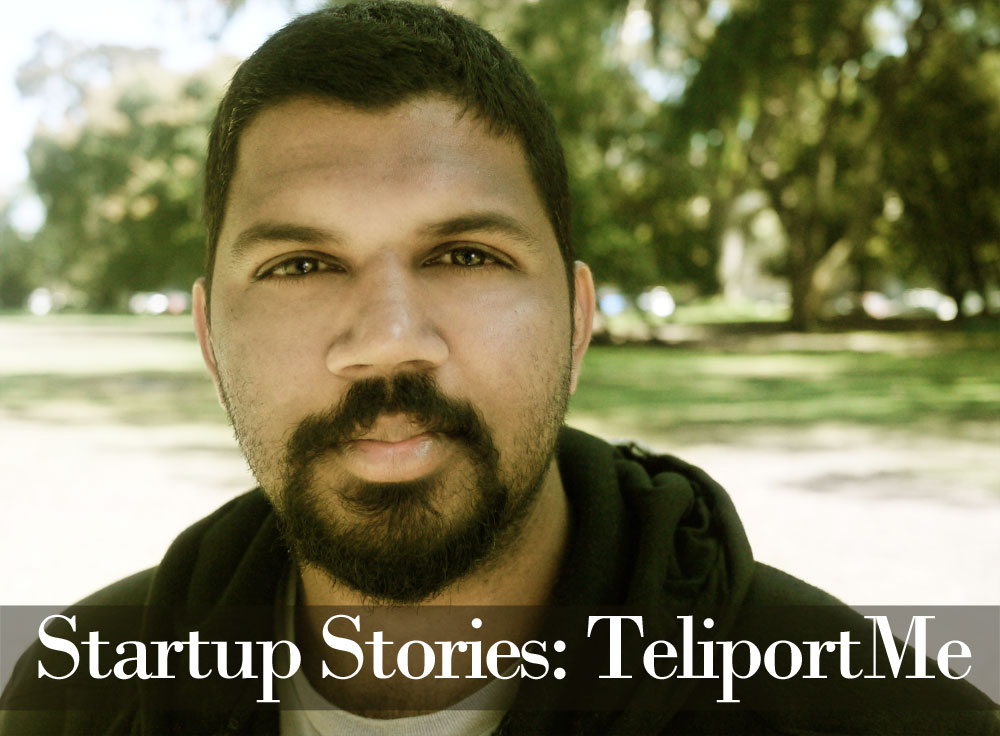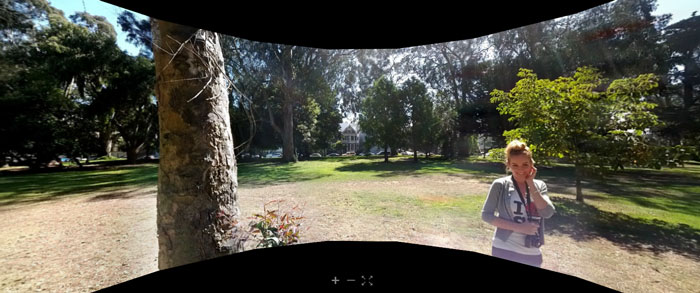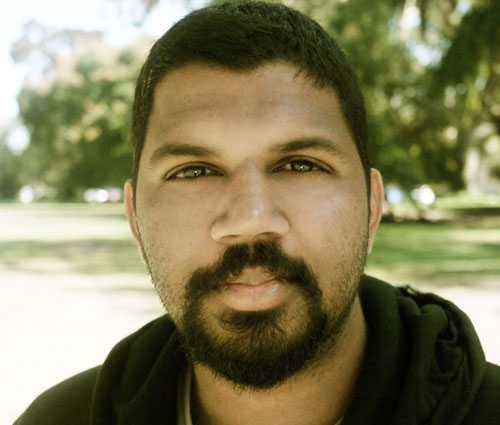
Vineet Devaiah was winded and glistening with a light sheen of perspiration. His bike had taken him from the Indian Consulate in San Francisco to the heart of dirty, divey Haight-Ashbury in record time; he didn’t want to miss this interview.
When Devaiah walked through the door, he thought he might have been too late.
“Jolie?” he said, asking if I was the person he’d come to meet, but his eyes were also asking if he was too late to tell me about his dreams, his near-misses with failure, his plans to change the world, and how all of these things brought him to San Francisco.
He thought someone else might have gotten to me first. Don’t we all have our own stories to tell, our own, unique plans and dreams? I only had time to hear one story that day, and because he was leaving in a couple days to return to India, he wasn’t going to get this chance again.
Startup Stories
An ongoing series in which VentureBeat writer Jolie O’Dell meets with San Francisco-area entrepreneurs and tells their stories. Previously:
But Devaiah was right on time. A few minutes later, I served him tea in my living room a few blocks away and asked him where he was born and how he grew up.
“I come from Bangalore,” he told me. “It’s a pretty big city. I started a company when I was 15, and I sold it for a million dollars.”
He mentioned this almost in passing, as though becoming a 15-year-old Indian millionaire is just something one does. I had to stop him with my questions: What? Really? How? And what impact did that have on his family?
“We didn’t come from a very rich background, but at that time the money — I didn’t really care, it was just a number,” he said. “I didn’t know how much a million dollars was.”
In 1999, when he was still just a teenager, Devaiah had access to a particularly high-end computer, part of the government-run Antarctic Study Centre. “It had a lot of weather data,” said Devaiah, “so I built an application that could predict weather, and it turned out to be really useful for farmers.” When the software was acquired by Infosys, one of the most influential companies in India’s tech landscape, Devaiah said, “It got preloaded on to a bunch of computers.”
While the experience of creation and acquisition was life-changing for him, Devaiah said, “It was scary, too, because the entire farming industry in India was depending on my software. … It was more like my 10th grade project. … I knew my software was flawed. If you look at normal weather data, you can only get 30 percent accurate. Mine was like, 30 percent to 35 percent accurate. But it was something.”
But Devaiah’s first brush with technological success was short-lived. He lost his father to cancer shortly thereafter and decided that instead of building a life around technology, he would devote himself to curing that horrible disease. But after an academic career that culminated in acceptance into a Harvard PhD program, Devaiah said he realized, “It’s a very long path in terms of having to execute your own ideas in research. Maybe I was not that diligent; I didn’t have the patience for this kind of research. I just decided I was going to get really rich and fund cancer research instead,” he half-joked.
Around a decade ago, Devaiah met Abhinav Asthana, who would later become his cofounder. When Asthana graduated from college, the pair decided to start a company. Called TeliportMe, the startup has a huge vision for the future but starts with a small, manageable first step.
Devaiah spoke excitedly about the grand plan: He wants to build the next General Electric, a huge enterprise with R&D labs cooking up the next versions of our technological future.
The main idea that the founders were fascinated by at the outset, said Devaiah, was “the concept of teleporting … the idea is that you would be able to experience any kind of environment sitting anywhere through augmented reality. You could sit in your living room and experience Paris.”
In a way, it’s similar to a lot of near-future science-fiction. Check out this short film that explores the possible upsides and downsides of AR as an integrated part of real life.
But unlike other visionary founders, Devaiah understood that you can’t just leap 10 years ahead because you have the idea and the tech to execute it; in this industry, an early idea is the same as a bad one. So the team of two decided to start small, to scale back into something usable, manageable, and fundable.
“Our first product was called Phototour, a collection of 3 billion geotagged images we scraped off the Internet,” he said. “You could go into people’s houses. It was spooky, but also really nice.”
Of course, the privacy implications of the app — even if the implication is just that photo-uploaders and web citizens don’t have a clue about privacy — were obvious and negative. “In the end, you want this information to come from users rather than scraping the Internet,” Devaiah said. “So, how do we get people to create immersive content?”
The answer came in the form of a simple, elegant photo app for Android, 360. The application lets users take 360-degree panoramas; individual images get stitched together as the user holds her phone and turns in a circle. Here’s a sample image Devaiah took while we were chatting in the panhandle of Golden Gate Park (click that link to get the fully navigable image):

The team was initially working on a more commercial version of the same concept. Called Bits360, that project focused on the AR/panorama experience for real estate, hospitality, and other industries that use virtual tours as a marketing tool.
Eventually, Devaiah and Asthana realized, “The thing we wanted to build was a crowdsourced Google Street View.” With that, they turned their attention fully to the mobile application for consumers.
But the mobile app, Devaiah stressed, is just the beginning.
“The form factor on your mobile phone is going to disappear,” he said, perhaps hinting at the world of Google Glass and laser-projecting contact lenses to come. “Sensor data will be used to create information. For that output to be sustainable, you need a large pool of crowdsourced, geotagged images, because sensor data can’t tell you what you’re looking at. … So we started out with this one thing.”
No doubt the TeliportMe team is thinking big. Google thought so, too, and thought enough of Devaiah and Asthana’s work that it made an acquisition offer, another eyebrow-raising milestone that Devaiah almost casually shrugs off.
Didn’t it take an immense amount of confidence to turn down such an offer? I asked him.
“It was very hard. When we got the offer, we were literally broke, less than a thousand dollars in our bank account,” he told me. “I came to Mountain View because I was giving a tech talk for Google. We got an acquisition offer from them and decided not to take it. … We were getting into the game for the long term.”
With that difficult rejection behind him, Devaiah started knocking on doors to raise his seed round. He had a couple verbal commitments but was quickly running out of time. “I had only two weeks to raise my seed round, because I had only come [to the United States] for two months. I needed a very solid reason to stay for a few months.”
Dave McClure’s accelerator program, 500 Startups, seemed like a perfect reason. TeliportMe applied and was accepted, and Devaiah said that while the process wasn’t too transformative for his product, it gave the international team excellent access to U.S. funds and influencers they wouldn’t have had otherwise. But it also brought more pressure to find a quick exit.
“We want to keep building technology that keeps pushing the limits of what can be done,” he said. “Look at GE; that’s how we look at ourselves. The offer [from Google] was great; it was a lot of money. But we’re young. We should make our mistakes now.”
The decision to not sell to Google meant that in the long term, TeliportMe would be competing with one of the web’s giants.
“We feel like Google is a million steps ahead of us in data, technology, money. They could crush us,” Devaiah said. “But Google is paying for Street View, and we’ve crowdsourced our data.
“There are massive risks and massive ‘ifs’, but the real risk we took was launching on Android. When we launched, it was not the leading OS.”
Devaiah said that building for just the top three or four devices wasn’t good enough for the young company. “For what we are trying to build, we want to be on the platform that has the most users. We could not predict the fact that Apple was going to sue Samsung. … Aside from that, Android will definitely be at least 70 percent market share.”
Also, in choosing Android over iOS, the team tackled the more difficult problem of building an app that would look great and work great on dozens of devices in all shapes and sizes.
“Some of our competitors on iPhone, they launch on Android, and our app is way better than theirs. That was the bet we took in November, and it’s coming to fruition.”
The 360 app launched this year and just hit its million-user milestone. Devaiah said people are taking panoramas mostly when they’re out and about, exploring a new area, or on a trip — exactly the kinds of user cases his team wants.
And with the seed round closed, the team will continue to grow, but in India for now. “I think the first two or three people are going to be from there,” he said. “We know who we’re going to hire, we’ve known them for a long time.” When TeliportMe’s lean phase comes to a close, Devaiah hopes to move the company to the Bay Area.
The day I met Devaiah, he was running errands, tying up some legal loose ends with the company’s name, which the Indian government found too generic — in spite of its being a made-up word composed of a misspelled word for a nonexistent technology and a pronoun. “But that’s India!” Devaiah sighed with a rueful smile.
The next day, he headed off to Sacramento to get approval from the state with participation from the consulate, stopping to take a series of breathtaking panoramas inside California’s State Capitol Building as he went about the day’s business, always looking around and looking for his place in the future.
VentureBeat's mission is to be a digital town square for technical decision-makers to gain knowledge about transformative enterprise technology and transact. Learn More

